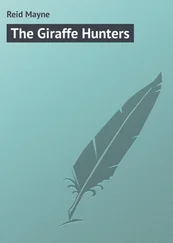Mayne Reid - The Tiger Hunter
Здесь есть возможность читать онлайн «Mayne Reid - The Tiger Hunter» — ознакомительный отрывок электронной книги совершенно бесплатно, а после прочтения отрывка купить полную версию. В некоторых случаях можно слушать аудио, скачать через торрент в формате fb2 и присутствует краткое содержание. Жанр: История, literature_19, foreign_antique, foreign_prose, на английском языке. Описание произведения, (предисловие) а так же отзывы посетителей доступны на портале библиотеки ЛибКат.
- Название:The Tiger Hunter
- Автор:
- Жанр:
- Год:неизвестен
- ISBN:нет данных
- Рейтинг книги:4 / 5. Голосов: 1
-
Избранное:Добавить в избранное
- Отзывы:
-
Ваша оценка:
- 80
- 1
- 2
- 3
- 4
- 5
The Tiger Hunter: краткое содержание, описание и аннотация
Предлагаем к чтению аннотацию, описание, краткое содержание или предисловие (зависит от того, что написал сам автор книги «The Tiger Hunter»). Если вы не нашли необходимую информацию о книге — напишите в комментариях, мы постараемся отыскать её.
The Tiger Hunter — читать онлайн ознакомительный отрывок
Ниже представлен текст книги, разбитый по страницам. Система сохранения места последней прочитанной страницы, позволяет с удобством читать онлайн бесплатно книгу «The Tiger Hunter», без необходимости каждый раз заново искать на чём Вы остановились. Поставьте закладку, и сможете в любой момент перейти на страницу, на которой закончили чтение.
Интервал:
Закладка:
The fearlessness exhibited by the Indian himself in regard to the jaguars is easily explained, since it was by the destruction of these fierce animals that he got his living. His calling was a peculiar one, though common enough throughout the tropical regions of America. He was, in fact, a tigrero , or tiger-hunter, a class of men whose sole occupation consists in pursuing, à l’outrance , the different beasts of prey that ravage the flocks and herds of the great haciendas de ganado , or grazing estates. Among these predatory creatures the jaguar is the most destructive; and the hunting and slaying of these animals is followed by many men – usually Indians or half-breeds – as a regular profession.
As the jaguar ( Felis onca ) in all parts of Spanish-America is erroneously called the tiger ( tigré) , so the hunter of this animal is termed a tiger-hunter ( tigrero ). Many of the more extensive estates keep one or more of these hunters in their pay; and the Indian we have introduced to the reader was the tigrero of the hacienda Del Valle. His name and nation were declared by himself in the speech that followed —
“Ah!” he exclaimed with an air of savage exultation, “neither tigers nor men may laugh with impunity at Costal, the Zapoteque. As for these jaguars,” he continued after a pause, “let them go for this night. There will be nothing lost by waiting till to-morrow. I can soon get upon their trail again; and a jaguar whose haunt is once known to me, is a dead animal. To-night we have other business. There will be a new moon; and that is the time when, in the foam of the cascade, and the surface of the solitary lake, the Siren shows herself – the Siren of the dishevelled hair.”
“The Siren of the dishevelled hair?”
“Yes; she who points out to the gold-seeker the rich placers of gold – to the diver the pearls that lie sparkling within their shells at the bottom of the great ocean.”
“But who has told you this?” inquired Clara, with a look of incredulity.
“My fathers – the Zapoteques,” replied Costal, in a solemn tone of voice; “and why should they not know? They have learnt these things from Tlaloc and Matlacuezc – gods they were, as powerful as the Christ of the pale faces. Why – ”
“Don’t speak so loud!” interrupted Clara, in a voice that betokened alarm. “The priests of the Christians have their ears everywhere. They might call it blasphemy; and carrambo ! the Inquisition has its dangers for blacks as well as whites!”
On hearing the word Inquisition the Indian involuntarily lowered his voice; but continued speaking in a tone that his companion could still hear him.
“My fathers,” said he, “have told me that the Siren never appears to any one who is alone. It is necessary that two be present – two men of tried courage they must be – for the divinity is often wrathful at being invoked, and at such times her anger is terrible. As two men are required, I need another besides myself. Will you then be my companion?”
“Hum!” said Clara. “I may boast that I am not afraid of a man; though I confess I cannot say the same about a tiger. As to your Siren, that appears to be the very devil – ”
“Man, tiger, or devil,” cried Costal, “why fear any of the three? What need one care for them – one who has a stout heart – especially when the reward of his courage is gold, and enough of it to make a grand lord out of a poor Indian?”
“And of a negro as well?”
“Without doubt.”
“Say, rather,” rejoined Clara, with an air of discouragement, “that gold could serve neither one nor the other. Black and Indian, both are slaves, and our masters would soon take it from us.”
“True enough what you say; but let me tell you, Clara, that the bondage of the Indian is approaching its end. Have you not heard that up in the north – in the tierra adentro – a priest has proclaimed the emancipation of all races, and equal liberty for all?”
“No,” replied the negro, betraying his total ignorance of the political affairs of the country, “I have heard nothing about it.”
“Know, then, that the day is at hand when the Indian will be on an equality with the white, the Creole with the Spaniard; and when an Indian, such as I, will be the master of both!”
The descendant of the Zapoteques delivered this speech with an air of proud exultation.
“Yes!” continued he, “the day of our ancient splendour will soon return. That is why I am desirous at present of acquiring gold. Hitherto I have not troubled myself about finding it; since, as you say, it would soon be wrested from the hands of a poor slave. Now that I am to be free, the circumstances are changed; and I want gold, by which I may revive the glories of my ancestors.”
Clara could not help casting a look of astonishment at his companion. The air of savage grandeur, visible in the countenance of the tiger-hunter – vassal of the hacienda Las Palmas – surprised him, as did also the pretentious manner in which he spoke about reviving the ancient splendours of his race.
The look and its meaning did not escape the observation of the Indian.
“Friend Clara!” said he, in a confidential tone, “listen to me, while I reveal to you a secret which I have kept for many long years – long enough for me to have seen fifty dry seasons, and fifty seasons of rain; and this fact can be confirmed to you by all of my colour and race.”
“You have seen fifty seasons of rain?” cried the negro, in a tone of astonishment, at the same time regarding his companion attentively, who in truth did not appear to be over thirty years of age. “Fifty seasons of rain?”
“Well, not quite fifty,” replied Costal, with a smile, “but very near it.”
“Ah! I shall see fifty more,” continued he. “Omens have told me that I shall live as long as the ravens.”
The negro remained silent, still held in surprise by the wild declarations which his companion was volunteering to make to him.
“Listen, friend Clara!” continued the tiger-hunter, extending his arm in a circle, and designating the four points of the compass; “in all the space that a horseman could traverse between sunrise and sunset – from north to south, from east to west – there is not a spot of ground that was not once possessed by my ancestors – the ancient lords of Zapoteca. Before the vessels of the white men touched upon our coasts, they were sovereign masters of all this land – from ocean to ocean. The sea alone was their boundary. Thousands of warriors followed their banners, and crowded around their plume-bedecked standards of war. In the ocean the pearl-banks, and on the land the placers of gold belonged to them. The yellow metal glanced upon their dresses and armour, or ornamented the very sandals upon their feet. They possessed it in such abundance, they scarce knew what to do with it.
“Where now are the once powerful Caciques of Tehuantepec? Most of their subjects have been slaughtered by the thunder of the white men, or buried in the dark mines – while the conquerors have divided among them and made slaves of the survivors! An hundred needy adventurers have been transformed into grand magnates – each endowed with a portion of the conquered territory; and at this moment the last descendant of the Caciques is forced to earn his subsistence almost as a slave – to submit to the tyranny of a white master – to expose his life daily for the destruction of fierce beasts, lest they should ravage the flocks and herds of his thankless employer; while, of the vast plains over which he is compelled to pursue his perilous calling, there remains to him not a spot he can call his own – not even the ground occupied by his miserable hut.”
Читать дальшеИнтервал:
Закладка:
Похожие книги на «The Tiger Hunter»
Представляем Вашему вниманию похожие книги на «The Tiger Hunter» списком для выбора. Мы отобрали схожую по названию и смыслу литературу в надежде предоставить читателям больше вариантов отыскать новые, интересные, ещё непрочитанные произведения.
Обсуждение, отзывы о книге «The Tiger Hunter» и просто собственные мнения читателей. Оставьте ваши комментарии, напишите, что Вы думаете о произведении, его смысле или главных героях. Укажите что конкретно понравилось, а что нет, и почему Вы так считаете.












